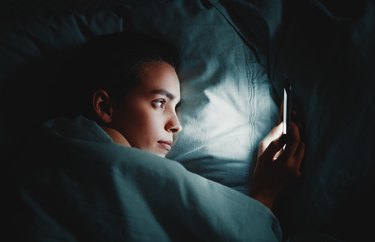
Insomniacs and night owls take note. Sleeping fewer than seven hours at night could have a major effect on your blood sugar levels — and increase your chances of developing obesity and Type 2 diabetes.
Video of the Day
Video of the Day
Sleep and Blood Sugar Levels
You might think that blood sugar levels drop while you're sleeping. If you're at rest, your body should be, too, right? But that's definitely not the case — your liver and pancreas are hard at work maintaining your blood sugar levels while you're conked out.
"Your liver stores glucose as glycogen and also makes glucose during sleep to maintain glucose levels in the body during sleep or periods of fasting," says Kelly N. Wood, MD, an endocrinologist at Piedmont Fayette Hospital in Fayetteville, Georgia.
"The pancreas makes insulin while you sleep to also keep glucose levels stable during the night. If the glucose level is too high, the liver absorbs glucose and stores it as glycogen. If the glucose level is too low, the liver converts glycogen back to glucose to return blood sugar levels back to normal," says Wood.
Your blood sugar also tends to spike as you get closer to morning. "At night, between 3 and 8 a.m., blood sugar levels tend to spike," Dr. Wood says. "This is called the dawn phenomenon. Cortisol levels tend to be highest in the morning, which raises an individual's blood sugar levels."
If you already have type 2 diabetes, that could be a problem. "People without diabetes make more insulin to handle the spike in blood sugar levels, but people with type 2 diabetes have insulin resistance, and those levels remain elevated," she says.
Missed Sleep Increases Health Risks
Your late nights could be fueling a rise in your blood sugar level and an increased risk for other unhealthy conditions while you sleep. Researchers have found links between poor sleep habits and elevated blood sugar levels.
A study published in the Journal of Sleep Research in August 2012 found evidence that getting less than the recommended seven hours of sleep can increase your risk for a host of health problems, including obesity and diabetes. And a February 2014 study in the European Respiratory Journal found that, among participants with sleep apnea, the more severe the condition, the higher their blood sugar levels.
The problem can be especially pronounced in people already diagnosed with diabetes. "A person with type 2 diabetes who does not get enough sleep will have less insulin released in the body, meaning more glucose stays in the bloodstream and more hormones, like cortisol, are released, making it more difficult to regulate blood sugar levels," Dr. Wood says.
People who have high blood sugar levels could find themselves falling asleep at work, even if they don't have diabetes. That's because fatigue is commonly associated with hyperglycemia, or high blood sugar, according to the Cleveland Clinic.
Get Some Sleep
Keeping your sleep schedule to the recommended seven to eight hours can help your body properly manage your blood sugar level. To help make this happen, be sure you stick to the same sleep and wake times, even on the weekends, suggests the Mayo Clinic.
Relax before bed by reading or taking a soothing soak. Exercise during the day, but not before bed. And try stress management tools, like meditation, if stress has you wide-eyed at night. Watching your diet, especially before bed, can also benefit you.
"Patients with diabetes are often told to never eat before bed as it could raise blood sugar levels, especially by the morning when blood sugar levels tend to spike," Dr. Wood says. If you're looking for a bedtime snack, she suggests something that's high in protein and low in carbohydrates, like a cheese stick or some nuts.
- Journal of Sleep Research: “Sleep Disturbance Is Associated With Cardiovascular and Metabolic Disorders"
- European Respiratory Journal: "Sleep Apnoea Severity Independently Predicts Glycaemic Health in Nondiabetic Subjects: The Esada Study"
- Cleveland Clinic: "Hyperglycemia (High Blood Sugar)"
- Kelly Wood, MD, endocrinologist, Piedmont Fayette Hospital, Fayetteville, Georgia
- Mayo Clinic: "Sleep Tips: 6 Steps to Better Sleep"
Is this an emergency? If you are experiencing serious medical symptoms, please see the National Library of Medicine’s list of signs you need emergency medical attention or call 911.